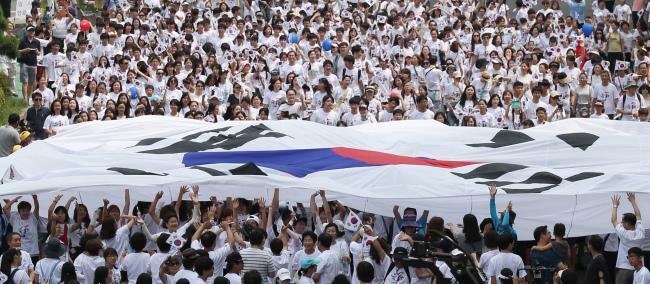Press Release
Shortly after its liberation from Japanese colonial rule in 1945, the peninsula faced yet another tragedy as North Korea invaded the South five years later, driving the territory into ruin and deepening the plight of people on both sides of the border.
Neither the 35-year foreign occupation nor the three-year war, however, could thwart South Korea’s epic political and economic ascent from the ashes.
More than 60 years on, the country stands as the world’s 13th-largest economy in terms of gross domestic product, a vibrant democracy and an emerging donor of development assistance seeking to bridge the rich and poor worlds. It is a member of the Organization for Economic Cooperation and Development and the Group of 20 major economies.

About 2,000 participants hold up a giant national flag, Taegeukgi, as part of the flash mob event to mark
the 70th anniversary of Korea’s Liberation Day at Olympic Park in eastern Seoul, Saturday. Yonhap
“While going through the postwar and the Cold War periods, South Korea had to find its own way to survive and prosper between the superpowers such as the U.S., China, Japan and Russia, overcoming the handicap of its territorial division,” Jeong Han-wool, executive director and a senior researcher of the East Asia Institute, an independent think tank, said in a recent report.
“For the last 70 years, South Korea has not only risen from poverty but also gone from an aid recipient to one of the major economic donors, along with successful democratization after decades of dictatorship.”
Seoul bears almost 2 percent of the U.N.’s annual regular budget of $5.53 billion for 2014-15, respectively, as the agency’s 13th-largest contributor. It also pays a similar share of the U.N.’s peacekeeping operations costs totaling $7.06 billion. In addition, it provides more than $5.5 million to 40 U.N. affiliates and other organizations including the OECD, while funding some 60 projects run by the UNDP, UNICEF, UNHCR and other institutions, according to the Foreign Ministry.
As of January, 530 South Koreans work at international organizations around the globe, 46 of which are at director or higher levels, elected officials or judges, ministry data shows. Seoul has also given birth to chiefs of key multinational agencies including the U.N. and more recently the International Maritime Organization, while hosting major conferences such as the Asia Pacific Economic Cooperation summit in 2005, G-20 summit in 2010 and Nuclear Security Summit in 2012.
South Korea’s 2010 enrollment in the OECD’s Development Assistance Committee was another milestone. It has since been scaling up its aid commitments and personnel to help developing nations fight poverty, disease, climate change and other mounting tasks. Last year, it doled out more than $1.85 billion in ODA, up about 5.4 percent from a year earlier, becoming the world’s 16th-largest patron.
In line with its growing economic might and contribution to world affairs, the country’s national prestige is seen to be improving. In a poll conducted late last year by the Seoul-based EAI, survey firm GlobeScan and the BBC World Service in 21 nations, 38 percent of respondents said that South Korea plays a positive role in the global community, marking a 6 percentage point rise from five years ago, whereas 34 percent projected negative images. The biggest increases came from major Western economies such as the U.S., the U.K. and France, Jeong noted.
“Taking into account that the global image of a country is highly correlated with its economic success, it seems that South Korea’s remarkable economic achievements, along with its active role in international organizations such as the G-20, the U.N. and the OECD, have enhanced its global status and positive image among foreign countries,” Jeong added.
Under President Park Geun-hye, Seoul has been ramping up what it calls middle-power diplomacy aimed at boosting its say on regional and global conundrums by bridging the advanced and developing worlds. It launched an informal consultation body dubbed MIKTA with Mexico, Indonesia, Turkey and Australia in late 2013.
Yet the newly defined foray has brought challenges and dilemmas, ranging from a prolonged inter-Korean standoff to volatile relations with Japan.
Just like her predecessors, Park has introduced a series of initiatives for cross-border cooperation and unification preparation since her swearing-in in 2013, only to be rejected by Pyongyang and die out even before taking off due chiefly to their unrealistic goals and conflicting action plans.
With North Korean leader Kim Jong-un showing no signs of abandoning his nuclear ambition, security concerns and ensuing dependence on the U.S. will likely persist for many years, if not decades, to come, taking a toll on Seoul’s global clout and future potentials of a unified Korea.
Japan’s economic handouts offered under a 1965 pact to normalize the bilateral ties provided seed money for the development of nationwide infrastructure and core industries on the war-ravaged soil.
Yet South Korea has in recent years grown more vocal in history spats on the back of Japan’s constant attempts to whitewash its imperial past and atrocities including its sexual enslavement of Korean women during World War II. Seoul continues to demand an official, sincere apology and compensation for the victims, which Tokyo claims has already been settled through the 1965 agreement.
Their strained ties have placed Washington in a tricky position as they complicate its efforts to bolster trilateral security collaboration with its two prime regional allies in line with its strategic refocus to the Asia Pacific amid a rise of China.
“As far as South Korea-Japan relations work normally, the three-way partnership could be a mechanism that responds to security threats in the region such as from North Korea in a most shrewd manner,” Kim Sung-han, a former vice foreign and current international relations professor at Korea University, said in a recent analysis.
“As Seoul needs to draw Beijing’s cooperation for future unification, it should keep the partnership from looking like a trilateral alliance against China and driving the broad picture into a South Korea-U.S.-Japan versus North Korea-China-Russia face-off.”